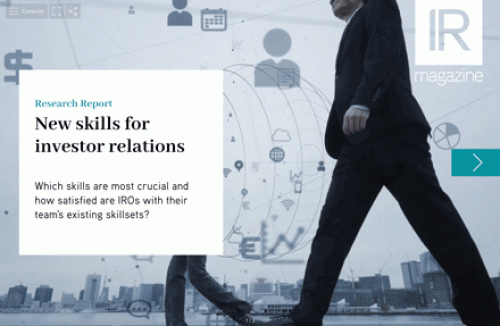Jose Rojo, Santander's new head of UK shareholder relations, on leaving Spain to set up shop with Abbey
Last year was a great one for Santander. The bank was a star performer in its sector, its share price rising some 60 percent in less than 12 months. In addition to doing very well out of the ABN Amro deal as part of the Royal Bank of Scotland-led takeover consortium, Santander also reaped the rewards of steering clear of subprime liabilities, making the retail bank one of the few beneficiaries of 2007’s credit debacle.
After the takeover of former UK building society Abbey in November 2004, Santander’s new head of UK shareholder relations, José Rojo, moved from Spain to set up shop with the incumbent Abbey staff. Things weren’t always plain sailing, however, as both sides had to adjust to a new way of working.
‘At first it was interesting because there was a bit of a culture clash – Latin people tend to be more enthusiastic and the British more organized,’ Rojo says. ‘Now, post-integration, the Latins are getting more organized and the British more enthusiastic. Abbey staff members have always been very organized, but they always used to say they needed three months to plan ahead – now we have much more flexibility.’
With half of Santander’s global shareholder base residing in the UK, the bank decided a designated UK shareholder relations department was necessary. At present the bank boasts 1.3 mn British shareholders, 60 percent of whom are also customers.
First contact
Like many banks, Santander separates its institutional IR department from its dealings with retail shareholders, with the institutional IR department operating from Madrid. ‘We essentially work separately, but we do organize roadshows with the institutional IR team a couple of times a year,’ explains Rojo, a former economist.
He had his first taste of shareholder relations at Santander’s Madrid offices back in 2004 after a brief stint doing institutional IR before arriving in the UK to dote on Abbey’s retail shareholders.
The Spaniards have also had to get to grips with a relatively uneducated retail shareholder base. ‘Abbey shareholders in the UK are different from their Spanish retail counterparts because many in the British group acquired their allocation when Abbey National demutualized in 1989,’ Rojo notes. ‘Our main task was to communicate regularly with our new Abbey shareholders; we send out six regular communications a year.’
While some were skeptical about a takeover by the Spanish bank, the overwhelming majority of Abbey shareholders retained their share allocation. ‘The first year was hard, but the second year we were able to give more figures and shareholders began to think, These guys must be doing something right,’ says Rojo.
In a bid to win over investors the bank recently organized a UK tour taking in five cities, making it one of the first companies to offer regional investor roadshows in the UK. Santander has further wooed investors by offering trips to Formula One motor races and theatre tickets. ‘You have to do more than just give dividends,’ Rojo explains.
As part of its charm offensive, Santander offers unique discounts on financial products to tempt shareholders to reinvest their cash. ‘Other companies often see retail shareholders as an expense,’ Rojo adds. ‘We think the opposite. We see that sort of holding as a chance for people to become part of the company and learn about its thinking.’
Youth appeal
While the Spaniard appreciates the feedback he receives from the Brits, it’s not always favorable. ‘In my experience, the English complain more than the Spanish, but they are also quick to congratulate you when things go well,’ he observes.
Looking ahead, the bank is attempting to reach out to younger investors and potential customers. At present 80 percent of its UK shareholders are over 65 years of age. ‘We are increasing our university presence by sponsoring events and offering intern programs and grants,’ Rojo notes.
‘Also, through our sponsorship of the British Grand Prix, people are becoming more aware of the company,’ Rojo adds. That sponsorship has helped Santander to raise its profile and spice up the otherwise staid image of retail banking.
Whether the bank can continue its unprecedented success will depend largely on the residual subprime damage suffered by its competitors. For the moment, however, it can count on some very loyal retail investors and customers.










